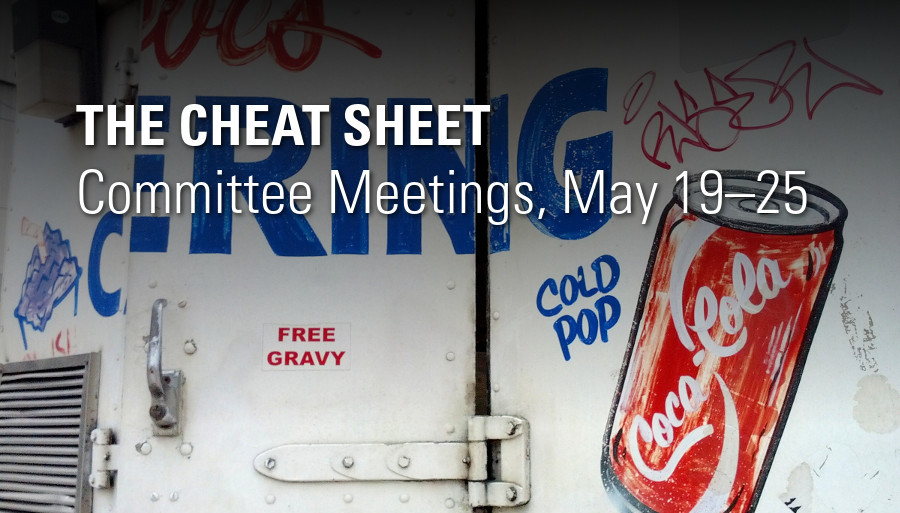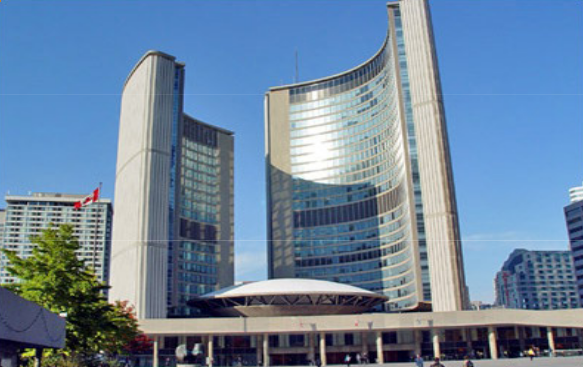Just one of those little moments that make council-watching worth it: Cllr Layton breaks the fourth wall during the 2015 budget debate. I’ve included his whole speech for context; skip to around 3m40s for the good stuff.
Tag: budget
The Cheat Sheet: Committee Meetings, May 19-25
I have been falling behind on my committee-agenda-reading agenda, I’m afraid. Better late and slightly half-assed than never. Coming up in the next few weeks: the final 2014 budget variances; extreme cold-weather drop-ins; misuse of TTC fuel credit cards; wildlife encounters; and more. Continue reading The Cheat Sheet: Committee Meetings, May 19-25
The Cheat Sheet: May 5 City Council
Just in time for my 30th birthday, I’m getting the best present ever: a City Council meeting! This month’s agenda is jam-packed with important items, so fix yourself a drink while you read this. Up for discussion: funding the Scarborough subway, diversity on the TTC board, a new City Manager, the social housing waitlist, (not) fixing basement flooding, and more. Continue reading The Cheat Sheet: May 5 City Council
Financial Facelift: Debt doubts cast shadow for world-class city with major expenses
Toronto chose to put low taxes ahead of infrastructure and services, but it has put her in a bit of a bind. She is 181 years old and has diverse thriving industries, a vibrant cultural scene, and well-loved municipal services like parks and libraries.
She has several major expenses, ranging from large-scale capital projects to everyday service improvements, all of which she wants to pay for without raising taxes or going into debt. As the nation’s economic hub, Toronto has substantial earning power — but she chooses to take in less revenue than she could. Continue reading Financial Facelift: Debt doubts cast shadow for world-class city with major expenses
The Cheat Sheet: Dec. 11 City Council
The first real City Council meeting snuck up on me! Much of the agenda will be familiar if you followed last week’s Executive Committee meeting. SmartTrack makes its debut, the budget schedule gets settled, and Mammoliti’s in trouble again.
2015: Threat or Menace?
Warning, serious wonkery ahead.
So I was a tad alarmed to see, in last month’s council agenda, this operating budget variance report projecting a year-end deficit of $1.783 million. And I’ve also been going back to David Hains’s look at the formidable 2015 budget gap and wondering if there’s anything to it. Basically, I’m wondering 1) how much of a mess will the next mayor inherit?, and 2) do they even know?
A Very Special Cheat Sheet: #TObudget 2014
- A Note: Operating Vs. Capital
- First, Some Context
- Operating Budget
- Capital Budget
- The Most Disingenuous Game
I don’t usually do Cheat Sheets for special meetings, but this one is for the 2014 budget! I love the budget!!! The entire exciting process, which started all the way back in November, is culminating this upcoming Wednesday in a meeting sure to be full of delightful surprises, dramatic reversals, procedural confusion, and petty, childish infighting. Continue reading A Very Special Cheat Sheet: #TObudget 2014
The Cheat Sheet: December 16 City Council
Disclaimer: For entertainment purposes only. Check out the full agenda.
Last meeting, we saw the Mayor reduced to a figurehead, with most of his responsibilities (and office budget) going to Deputy Mayor Norm Kelly. In a fit of pique, the Mayor insisted on holding and speaking on various petty routine items until the clock ran out, and promised to do the same next time. I hope he’s forgotten, because there’s plenty of actual stuff to get done. Continue reading The Cheat Sheet: December 16 City Council
Blessed in the city: charity, justice, and the budget
Blessed shall you be in the city, and blessed shall you be in the field. (Deuteronomy 28:3)
It is curious that God’s revelation tells us that the fullness of humanity and of history is realized in a city. We need to look at our cities with a contemplative gaze, a gaze of faith which sees God dwelling in their homes, in their streets and squares…In cities, as opposed to the countryside, the religious dimension of life is expressed by different lifestyles, daily rhythms linked to places and people. In their daily lives people must often struggle for survival and this struggle contains within it a profound understanding of life which often includes a deep religious sense.
…On the one hand, there are people who have the means needed to develop their personal and family lives, but there are also many “non-citizens”, “half citizens” and “urban remnants”. Cities create a sort of permanent ambivalence because, while they offer their residents countless possibilities, they also present many people with any number of obstacles to the full development of their lives. This contrast causes painful suffering. (Evangelii Gaudium, paras. 71-75)
If there is any meaning we can take away from the big Budget Committee meeting falling smack dab in the middle of Hanukkah this year, it’s that, after a certain point, doing more with less requires a genuine miracle. As we Torontonians have been reminded, there is simply not enough money to go around. We must choose what to keep and what to cut. Partly this is an exercise for pencil-pushers and infographic designers. But it is also a call to us to articulate a broad, long-term vision of what a city should be and of city-dwellers’ obligations to each other.
Over the past few years of following the budget process, I’ve watched two divergent visions struggle for supremacy. At heart each embodies a different value: Charity vs. Justice. For me it is difficult to disentangle these words from their religious roots — and I think it’s unwise to do so, because the lens of religion permits us to see the true relationship between them. Which I’ll get to. But now: budgeting!
There are some whose goal is to cut spending and shrink government. This is a short-term sort of plan that favours paying off loans instead of making investments, and demands flatlined budgets, which are essentially cuts. For a city department to achieve 0% increases when prices gradually inflate requires putting off projects and new hires, lowering service standards, raising user fees, and falling behind on the least urgent matters, in the hopes that there will be an influx of purified oil cash before the crisis point. Unless there is a change of administration, the cash is never coming, and the system exists in a long drawn-out state of crisis: overcrowded, aging transit; a lengthening waitlist for increasingly dilapidated affordable housing; parents struggling to find daycare.
As government shrinks, it effectively “downloads” social services to non-profit enterprises (churches, charities, food banks) and individuals (couchsurfing because you can’t afford rent, getting a neighbour or relative to watch the kids, asking friends or family for money and personal favours). Rather than being supported through taxes, these “services” are reliant upon grants and fundraising. This is Charity — a fundamentally individualistic, precarious, pity-based model where the privileged benefactor donates to a deserving recipient (whether a person or an organization) out of the goodness of their heart.
In opposition stands a vision of growth and abundance. This is advocated by those councillors who often argue that in one of the richest countries in the world, no one should have to go hungry or homeless. Instead of relying on “means tests” to efficiently portion out access to city services — school breakfasts, recreation programs, childcare — to the most needy, we could work towards a system where these are accessible to everyone. The City is uniquely positioned to take on big goals like these, having excellent financial standing (which makes it cheap to borrow money) and a large tax base.
This approach necessitates selling people on the long-term benefits of investing in social programs and infrastructure rather than short-term savings (“you’ll save $60 a year”). Long-term savings are less tangible, but much greater: the value of an education at a library or in a rec centre; the damage that doesn’t happen when our water infrastructure can cope with floods; people being able to go to work or school because they have daycare taken care of; the shelters we don’t have to open because more people have adequate housing.
The first step is recognizing that widespread inequality is injustice — not just an accumulation of individual moral failings or bad choices. Justice means that we give up our right to determine who “deserves” basic human needs. Justice calls on everyone to pitch in as neighbours helping neighbours. This is not a virtue; it is an obligation, and it must be unconditional.
You can do both justice and charity, obviously — but many people do charity and think that, because they’ve chipped in, there is nothing further they have to do. The ultimate goal of justice, on the other hand, is to render charity unnecessary.
Charity is often associated with religion: tithing, food drives for Christmas, the Salvation Army and all that. This irritates the fuck out of me because justice, as I’ve described it, is also a religious activity, born thousands of years before anyone could even conceptualize “secularism” or became an “activist”. It just happens to be hidden in the really boring parts of the Bible and the Talmud that nobody reads! Look how all these rabbis interpreted these verses about farming to talk about how your income/property doesn’t really belong to you — part of it belongs to the poor, and if you withhold it (or only distribute it preferentially, or make it difficult for them to get) you are basically stealing what is rightfully theirs. (This is echoed by the early Church Father John Chrysostom, who Pope Francis quotes in his recent Evangelii Gaudium: “Not to share one’s wealth with the poor is to steal from them and to take away their livelihood. It is not our own goods which we hold, but theirs.”)
In the Jewish tradition tzedakah is the word for both charity and justice, and Maimonides’ account of the eight levels of tzedakah makes clear that the highest forms of charity are justice. The very best kind of tzedakah is preventing someone from becoming poor in the first place, finding them a job, or becoming their business partner. Next is “to give to the poor without knowing to whom one gives, and without the recipient knowing from who he received”. And so on; you can read the link yourself. He works off the same principle as the other sages: the dignity of the recipient is paramount.
What does tzedakah look like in our city today? At its lowest level it is a cold, hungry, desperate person asking people coming out of the Tim Horton’s for change, and people giving them money just to get rid of them. Slightly above that is a school breakfast program coordinator pleading for funding at a Budget Committee meeting and Doug Ford cutting them a personal cheque. Above that would be situations where certain facilities or services are marked out as “for poor people” or require a “means test” to access — the Welcome Policy, TCHC, Priority Centres. Above that I would say is a city that can provide basic needs for everyone, and where receiving city services is not obvious nor shameful. That would be only the first step to a city that prevents poverty before it starts, and it’s such a lofty demand that any further steps are in the realm of science fiction, not policy.
If charity and justice are ultimately two ends of an ascending scale, why stop halfway, acting on only the individual and not the societal level? And if we really ought to work towards a society that prioritizes not just the physical well-being but the dignity of the most marginalized, why insist on ways that maintain the gap between the haves and the have-nots? That might get you tax credits and personal satisfaction, but it’s no way to build a city.
No, this is the fast I desire:
[…] To let the oppressed go free;
To break off every yoke.It is to share your bread with the hungry,
And to take the wretched poor into your home;
When you see the naked, to clothe him,
And not to ignore your own kin.[…] [Then] the Lord will guide you always;
He will slake your thirst in parched places
And give strength to your bones.
You shall be like a watered garden,
Like a spring whose waters do not fail.Men from your midst shall rebuild ancient ruins,
You shall restore foundations laid long ago.
And you shall be called
“Repairer of fallen walls,
Restorer of lanes for habitation.”
This passage expresses my approach to the budget, and city politics as a whole, in a nutshell: true city-building starts from the bottom up.
Growing up, budgeting, and other stuff
After I got out of my holiday depressive slump I managed to get off my ass and accomplish a few things. I resolved to be more conciliatory and politic, and even made it a few days before ranting about white-centric feminism or something. I cancelled my Rogers internet so I can switch to the cheaper ISP TekSavvy. I cleared my inbox. I made a doctor’s appointment. And—biggest of all—I applied for a credit card!
The thing about being broke, you see, is that you make terrible financial decisions. I could barely afford to buy things with my debit card, so why would I take on debt I certainly couldn’t pay off?
But a credit card opens the door to so many other things. I can buy stuff cheaper online. I could get a drawing tablet, for instance, that would let me do illustrations on commission and earn money on the side. I can buy cheap glasses. I can replace my ailing netbook. I can get a smartphone!—The smartphone was really what convinced me. Because right now I’m on a prepaid plan, and you can only get a good deal on a smartphone if you are on pay-after, which requires a credit check. And you can’t have credit, good or bad, if you don’t have a credit card.
I won’t be able to pay off the entire balance at once, but I can definitely do minimum monthly payments. And that’s an acceptable cost to take on, because I need to maintain a level of healthy debt in order to live like a Real Adult.
And yes, this is a metaphor for the budget and why we shouldn’t be afraid to borrow money, because this city could be so much more awesome if we were willing to invest in big things, rather than tightening our belts and scrimping and saving and settling for the cheap bread at No Frills. Have you ever had that bread? It’s dry and flavourless and unsatisfying and only $1.97. You can only go so many years on that bread before you put your foot down and say I want more. I deserve more. I’m going to get out of this miserable pit, somehow.—wait, where was I? Oh yeah. So I was talking about the budget, but also about my current situation. Increasingly I feel disconnected from the #TOpoli crowd. It’s hard to express how viscerally worried I am. I wish I could talk intellectually about debt ceilings and GTA property tax rates, but I’m afraid…
No, of course it’s not the end of the world. That’s the problem. These things aren’t often drastic or dramatic. We’ll just accept a little more anxiety, a few more aggravations. “The people want change“—for those at the bottom, the currents pass us by, there’s no change at all. When things are precarious you can’t afford to take chances. There’s less margin for error. Every resource you have—a spot on the waitlist, med samples from the doctor, someone who can stay home to watch your kid, an all-night bus route—you’re counting on, and if one doesn’t come through, it throws everything into disarray. And it occupies your thoughts constantly and you just want to explain to people what it’s like and we can’t wait another moment for housing/daycare/transit…
But, in reality, you need to be able to do both at once. You still have to talk politics the way the men, the journalists, talk politics. Be smart the way they want you to be smart, and witty, but not at their expense, and they’ll listen to you, and take your advice on those things you know about. It’s cynical, but you can’t afford to insist on having the conversation on your own terms. You can’t pour your heart out so you let it drip a little all the time into everything you do. That’s the idea, anyway.



